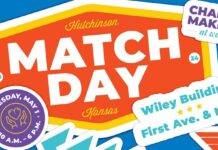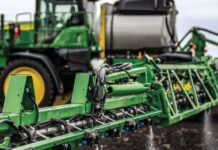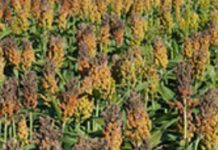From the Office of Public Affairs | http://www.news.ku.edu
Headlines
Study finds students self-sort in active learning spaces, with potential to push women out
LAWRENCE — A recent trend in higher education has seen universities install more active learning spaces, in which students can move their seats, collaborate and interact with one another, as opposed to more traditional lecture halls. But, as space in the former is limited, little is known about which students choose them. A new study from the University of Kansas found that students initially choose based on their social networks. That self-sorting, however, has the potential to push some students, most often women, from undergraduate programs.
Spencer Museum receives $250K from Institute of Museum and Library Services for database upgrade
LAWRENCE — The Institute of Museum and Library Services (IMLS) has awarded the Spencer Museum of Art $250,000 to upgrade its collection database, MuseumPlus, to the newest cloud-based version. Together with an IMLS grant awarded in 2021 to redesign the Spencer Museum’s websites, this funding will help improve access to and the sustainability of the museum’s digital resources.
Fall series will expand dialogue on reproductive justice
LAWRENCE — Since the U.S. Supreme Court issued its ruling on Dobbs v. Jackson on June 24, discussions around the globe have targeted the unknown future of reproductive rights in the United States. Through a series of online discussions, each featuring a panel of speakers from diverse fields, University of Kansas researchers will gather to further inform the conversation. The first session, “Kansas and the Region in Broader Context,” will take place at 5:30 p.m. Sept. 6.
Full stories below.
————————————————————————
Contact: Mike Krings, KU News Service, 785-864-8860, [email protected], @MikeKrings
Study finds students self-sort in active learning spaces, with potential to push women out
LAWRENCE — A recent trend in higher education has seen universities install more active learning spaces, in which students can move their seats, collaborate and interact with one another, as opposed to more traditional lecture halls. But, as space in the former is limited, little is known about which students choose them. A new study from the University of Kansas found that students initially choose based on their social networks. That self-sorting, however, has the potential to push some students, most often women, from undergraduate programs.
KU researchers observed students taking part in an organic chemistry course over the course of an academic year. Classes were offered in both an active learning space and a traditional, larger lecture hall with fewer active learning supports. Researchers found that more women chose the active spaces, and that at the semester break, there was an additional, substantial shift in who chose the active spaces.
Initially, results showed students largely chose based on their social networks. First, they looked at where the class was offered. They then relied on what friends told them about the spaces when making their choice. However, when researchers interviewed students again at the semester break, they found those most interested in switching to an active learning space or continuing there were more focused on learning chemistry like an expert. And the majority interested in active spaces were women.
“The vast majority of students who wanted to take classes in active learning spaces were women,” said Michael Ralph, doctoral candidate in educational psychology at KU and the study’s lead author. “Many were also honors students. These students prioritized learning about chemistry both in and outside the classroom. This became even more apparent by mid-semester, as more women wanted to transfer to the active learning rooms but couldn’t because of limited space.”
The study, written with co-authors Blair Schneider, Kansas Geological Survey; David Benson, associate professor of chemistry; and Doug Ward, associate director of KU’s Center for Teaching Excellence, was published in the journal Active Learning in Higher Education.
The research team previously published a study that found women and honor students tended to prefer the active learning spaces. While that study observed a moment in time, the current study aimed to better understand how students arrived at their learning space choices over time. But as the active learning spaces are limited, only a finite number of students can take those classes. Given that, the researchers wanted to understand more about how decisions were made by students from historically underrepresented groups.
The data showing that students who preferred active learning spaces were those who tended to think about the sciences outside of class suggested students who were beginning to think like expert chemists preferred the active spaces, Ralph said. That, combined with data that shows women and honor students prefer the spaces as well, suggests active learning spaces are valued by the students most likely to continue into graduate programs in the sciences and with potential for high achievement. Better understanding why students choose the active learning spaces, and why women were showing such a strong preference for them, can help reduce barriers to success for women in physical science and STEM more broadly.
While the current study did not examine factors such as race, socioeconomic status and other considerations that have been historically marginalized in the sciences, it can help open the door to those types of questions in the future, while simultaneously better understanding how active learning spaces serve students, whether they help retain highly qualified students and how higher education can best support young students interested in the sciences.
“We hear from women that they are looking for these types of spaces,” Ralph said. “So we used a statistical approach to examine how they makes choices about classrooms. It was helpful to be able to ask these questions directly and interesting to see the self-sorting that took place. Showing how some of these formative moments affect the students’ future choices and opportunities may allow us to help students earlier.”
-30-
————————————————————————
The official university Twitter account has changed to @UnivOfKansas.
Refollow @KUNews for KU News Service stories, discoveries and experts.
Tweets by KUnews
————————————————————————
Contact: Elizabeth Kanost, Spencer Museum of Art, 785-864-0142, [email protected], @SpencerMuseum
Spencer Museum receives $250K from Institute of Museum and Library Services for database upgrade
LAWRENCE — The Institute of Museum and Library Services (IMLS) has awarded the Spencer Museum of Art $250,000 to upgrade its collection database, MuseumPlus, to the newest cloud-based version. Together with an IMLS grant awarded in 2021 to redesign the Spencer Museum’s websites, this funding will help improve access to and the sustainability of the museum’s digital resources.
The Spencer Museum’s database is the foundation of all activities that fulfill its mission, including documenting its collection of more than 47,000 objects, organizing exhibitions and public programs, and recording data such as university and K-12 class visits. Much of this information is available to the public through the museum’s online collection. With IMLS support, the Spencer Museum will migrate more than 200,000 records and multimedia files to the new cloud-based system, increasing usability and accessibility for all audiences.
Jennifer Talbott, deputy director for operations and innovation, said the timing of this grant will allow the Spencer Museum to achieve goals outlined in its recent digital plan (pdf), including a complete redesign of the museum’s websites and online collection.
“Upgrading the database at this time will allow us to unite our existing websites on a more stable and sustainable platform, allowing us to develop customized tools and applications to better meet the needs of our digital audiences,” Talbott said.
In addition to supporting the museum’s online database, MuseumPlus powers a suite of five browser-based applications that present the museum’s collections, exhibitions and educational content in directed, audience-driven tools. These digital resources allow the Spencer Museum’s audiences to access its wealth of data to support visits to the galleries, classroom instruction, research and more. Rebuilding these applications with the new cloud-based MuseumPlus will ensure their longevity and make them easier to navigate for both users and developers.
This most recent grant from IMLS builds on a long history of their support for the Spencer Museum’s digital projects. They also funded the Spencer Museum’s initial work to digitize its collection in 2004, which allowed the museum to become one of the first U.S. museums to publish nearly 100% of its collection online in 2009.
-30-
————————————————————————
Subscribe to KU Today, the campus newsletter,
for additional news about the University of Kansas.
http://www.news.ku.edu
————————————————————————
Contact: Emily Ryan, The Commons, 785-864-6293, [email protected], @TheCommonsKU
Fall series will expand dialogue on reproductive justice
LAWRENCE — Since the U.S. Supreme Court issued its ruling on Dobbs v. Jackson on June 24, discussions around the globe have targeted the unknown future of reproductive rights in the United States. Through a series of discussions, each featuring a panel of speakers from diverse fields, University of Kansas researchers will gather to further inform the conversation.
This fall, The Commons will host a series of discussions that highlight the complexities of reproductive justice. The considerations surrounding legislation on reproductive rights often appear on ballots reduced to binary decisions, which obscure the many and layered contexts within which they exist. This series will draw upon the knowledge of researchers and practitioners across areas of study and service, to help inform audiences about the roots and ramifications of present-day discussions around reproductive rights.
Alesha Doan, professor of women, gender & sexuality studies and of public affairs & administration, is co-leading the event series with Emily Ryan, director of The Commons.
“We can expect to see abortion rights political battles unfold for the foreseeable future,” Doan said. “As they develop, the legal chaos and public health crisis created by the U.S. Supreme Court’s decision will continue to affect thousands of people who no longer have agency and autonomy to chart the course of their reproductive lives.”
This series offers information so that all attendees will be more informed about current regulations across geographic areas, ongoing political action appearing in local, regional and national efforts, and new effects of legislation.
“As we know, research is constantly influencing and influenced by public decision and behavior,” Ryan said. “Researchers and centers across KU’s campuses are working to ensure that accurate information is conveyed to public audiences as well as to policymakers. To that end, this series of events aims to bring together some of the many perspectives that are informing our understanding of reproductive health care in the 21st century.”
In addition to presentations from researchers in disciplines from across the university, the events will include information about resources specific to students at KU.
The first event will take place at 5:30 p.m. Sept. 6, and discussion will be framed around “Reproductive Rights in Kansas and the Region.” Presenters include:
1. Alesha Doan
2. Don Haider-Markel, professor of political science
3. Sarah Kessler, associate professor of family medicine & community health, KU Medical Center
4. Sam Brody, associate professor of religious studies
5. Rachel Gadd-Nelson, director of the Health Education Resource Office
6. Nikita Haynie, director of the Emily Taylor Center for Women & Gender Equity
The second event will take place at 5:30 p.m. Oct. 12, and discussion will be framed around “Impact and Access Across Populations.”
Events will be offered online and are open to the public. To register to attend the Sept. 6 event, visit https://bit.ly/KURepro.
-30-
————————————————————————
KU News Service
1450 Jayhawk Blvd.
Lawrence KS 66045
Phone: 785-864-3256
Fax: 785-864-3339
[email protected]
http://www.news.ku.edu
Erinn Barcomb-Peterson, director of news and media relations, [email protected]
Today’s News is a free service from the Office of Public Affairs





